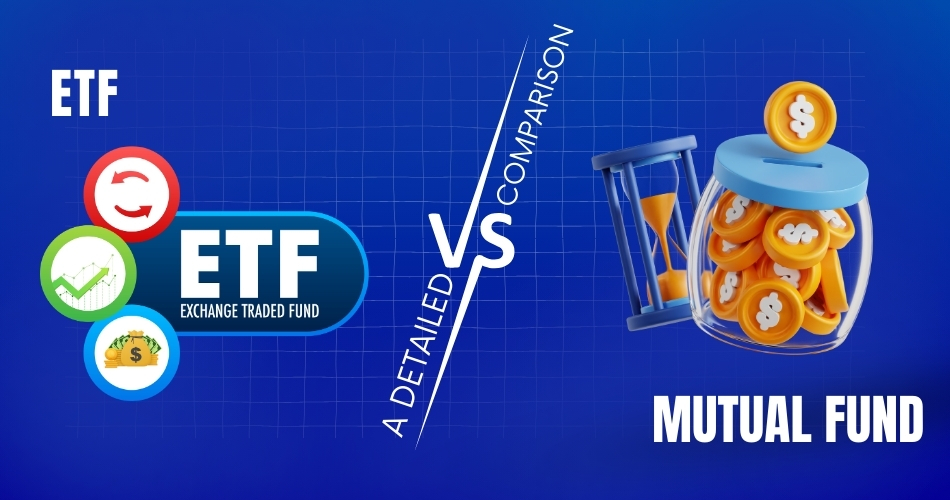Choosing the right financial instrument is an important factor for those who want to excel in the long-term results on their investments. Among the popular choices for even amateur investors and veteran ones, Exchange-Traded Funds and Mutual Funds are two very hot items. They are quite alike, but their differences have made them distinct and, subsequently, have influenced many investors’ decisions over the matter. In this comprehensive piece, we tried to understand the difference between ETFs and mutual funds, breaking down their pros and cons while delving into finer details regarding how each functions in different market conditions.
What Is an ETF?
An ETF is actually a scheme like an investment fund, tracking any particular index, sector, commodity, or other underlying assets. ETFs are traded on stock exchanges and tracked exactly like common stocks throughout the trading day. The ETF full form indicates the nature of this instrument-the very characteristics of stocks and mutual funds are merged into one for the investor.
The meaning of ETF goes beyond its structure; they provide diversification, holding a basket of assets like a mutual fund. ETFs may track an index, like the Nifty 50 ETF, commodities like gold, or sectors like technology.
What is a Mutual Fund?
This pools money from a number of investors to invest in a wide range of assets such as stocks, bonds, and other securities. Unlike ETFs, mutual funds do not trade on the stock exchange and are priced one time per day, calculated on the basis of the NAV at the end of the trading day.
Mutual fund investors invest directly in the fund rather than the secondary market. The fund manager manages these funds actively, and he tries to better the market or certain benchmarks.
Principal Differences Between ETF and Mutual Fund
1. Trading Mechanism
Another important difference is in the trading mechanism between ETF and mutual funds. ETFs are traded on stock exchanges like stocks, so you can buy or sell it throughout the day at the existing market prices. Mutual funds on the other hand are traded only once after the marketplace closes upon their NAV for the day.
This elementary difference bears a consequence on the transaction’s flexibility. With ETFs, one is afforded real-time opportunities to trade, thus making provision for the investor to react to market movements considerably. Mutual funds, as noted, constrain this ability because one can only buy or sell them at the end of the day.
2. Management Style: Active vs. Passive
It is typically actively managed by an organization of investment analysts who are seeking above-market performance beyond what would have been obtained from the market through choosing individual equities or other securities that they believed would produce superior returns. Active management is more expensive, but the potential to beat the market gives a powerful appeal to some investors’ quests.
Conversely, ETFs are usually quite passive when it comes to management. They can track a specific index, for example, the Nifty 50 ETF. Usually, passively managed funds result in lower costs than actively managed mutual funds. However, what is more probable is that the returns delivered by an ETF are quite similar to that of the index and do not surpass it.
3. Cost Structure
One of the most significant differences that can be cited when comparing an ETF with a mutual fund is cost structure. On the general aspect, ETFs are less expensive since they apply a passive management style. Since an ETF tracks an index or a sector, there is less active management that would go to the management fees. No-load fees are also normally applied to ETFs which makes it more advisable for long-term investments.
Actively managed mutual funds tend to have larger expense ratios with the management fee, transaction fee and even, in some cases, a front-end or back-end load fee. Unless you are earning interest or compounded income on returns, the increased cost could mean that it ultimately ends up shaving into your return, particularly in low-performing or highly volatile markets.
4. Tax Efficiency
Tax efficiency is another important argument from the side of the ETF vs mutual fund debate. ETFs are more tax-efficient generally for a number of reasons. Because an ETF trades on an exchange, people can sell their shares to other people rather than the underlying fund having to sell its assets directly. This causes relatively little in capital gains taxes for the investor, which often occurs when mutual funds have to sell their assets to redeem for the request.
Mutual funds, however, do generate capital gains distributions to shareholders who have not sold their shares, thus creating a taxable event. Meaning mutual funds are less tax efficient than ETFs.
5. Liquidity
Liquidity refers to the case with which an asset can be bought or sold in the market without affecting the price. Since ETFs are traded in exchanges, their liquidity relates to the trading volume and market demand for the ETFs. The more popular the ETF is-the ones tracking, for example, big indices like Nifty 50 ETF-liquidity would better be there.
Mutual fund shares do not have uniform liquidity. Besides, by the end of the trading day when the investor can sell shares at a NAV price, that may be different from the day’s price. Hence mutual funds are not flexible enough to respond to market volatility.
6. Investment Minimums
One of the more practical differences, in comparison between ETF and mutual funds, involves the investment minimums. Mutual funds usually demand a certain minimum for the initial investment that could be a few thousand rupees and up to several lakhs of rupees according to the fund.
ETFs, however, do not have any minimum investment above the cost of one share. This makes them accessible to new investors or those with little capital.
ETF vs Index Fund: Are They the Same?
ETF vs index fund needs to be different because despite the fact that they both track a specific index such as Nifty 50, they work differently. An index fund is a form of mutual fund that tracks a specific index in a passive manner. It isn’t trade during the day but it is price at the end of the trading day just like any other mutual fund.
There are two differences between the two. An index-tracking ETF could be trade intraday on an exchange, whereas a mutual fund cannot. While passive, the trading mechanics of an ETF allow for more flexibility than a mutual fund.
Is an ETF Better Than a Mutual Fund?
The question of “is an ETF better than a mutual fund?” depends on an investor’s objectives, risk tolerance, and investment horizon. ETFs are generally beneficial for cost-sensitive investors who would like intraday trading and tax efficiency. Therefore, the appeal is very high to those who prefer passive investment strategies with low costs.
But mutual funds suit investors who want professional management and the potential for market outperformance. This option works well for those who prefer not to monitor their investments closely and have little concern for intraday trading.
Nifty 50 ETF vs Index Fund: Which is Better?
The basis of this comparison between the Nifty 50 ETF and an index fund narrows to flexibility and cost. In a comparison of a Nifty 50 ETF, you get all-day trading, which has real-time access to market movements. Since the index fund follows the same index, it lacks flexibility because you can only buy or sell at the end of the day.
Both charge low fees because the management is passive. However, in terms of liquidity and tax efficiency, the ETF does lead better. The ETF will be better for active traders or those who want to hedge against short-term movements of the markets.
Conclusion
The primary differences between ETFs and mutual funds lie in their structure, trading mechanisms, costs, taxation, and flexibility. Investors should consider their financial goals and risk tolerance before choosing between the two. ETFs offer real-time trading and tax benefits, while mutual funds provide professional management with potential for outperformance. Understanding these subtleties is essential for making the right decision.
Cost-effective and flexible investment options with low tax implications appeal to passive investors. Those seeking professional management and a more aggressive strategy may find mutual funds better suited to their needs.
Ultimately, your choice should consider your financial goals, investment style, and the prevailing market outlook. Whether choosing between a Nifty 50 ETF or an index fund. This guide provides comprehensive insights to help you navigate these investment vehicles confidently.

